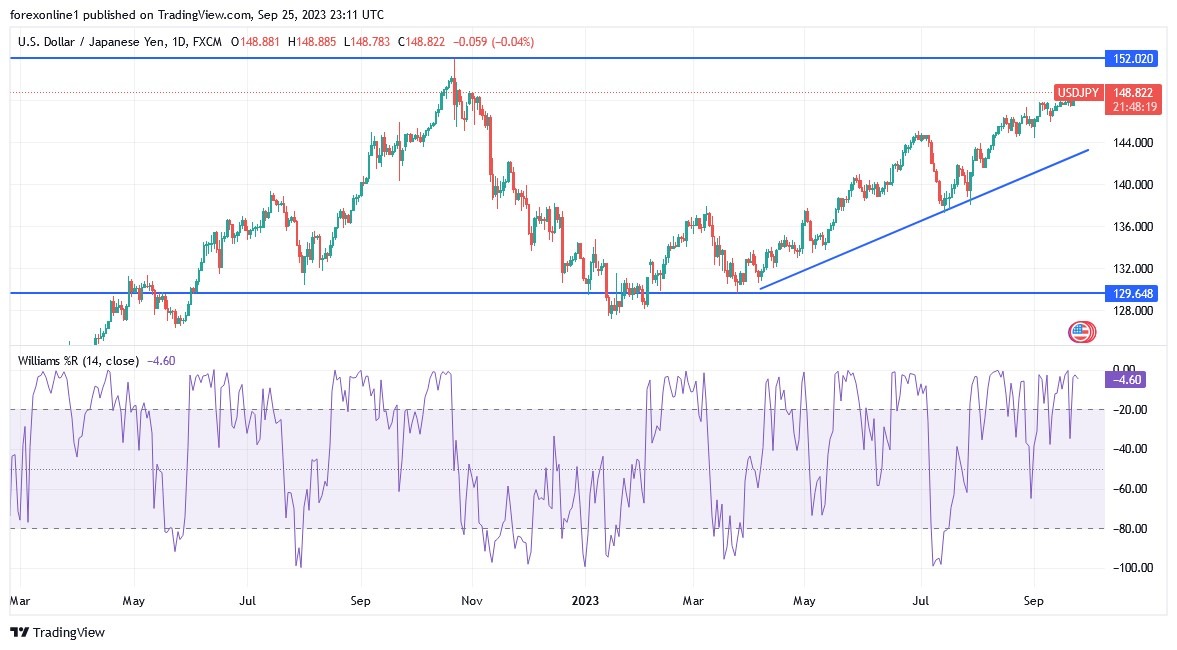The leadership of the Bank of Japan emphasized the need to nurture economic growth through stimulus policies due to a wide range of uncertainties. They are indicating that it is premature for financial markets to predict interest rate hikes in the near term. Therefore, the bulls had a good opportunity to push the USD/JPY currency pair towards the resistance level of 148.96, the highest it has had in ten months, before settling around the 148.75 level at the beginning of Tuesday's session.
Top Forex Brokers
For his part, Bank of Japan Governor Kazuo Ueda and Deputy Governor Shinichi Ushida used separate appearances to convey the message that economic recovery and price trends are too risky to consider changing monetary policy. Uncertainty about wage gains and inflation is high, so the goal of achieving 2% inflation with wage gains is not yet "on the horizon," Ueda told business leaders in Osaka on Monday. Ushida pointed to the existence of "very high" doubts in explaining the reason for the patience in an event in Tokyo.
These statements came after the Bank of Japan decided last Friday to keep monetary policy steady, and it appears to be an extension of the Bank of Japan's efforts to back off expectations of a policy change after Ueda's comments in an interview with the local press prompted economists to move forward with their expectations for a rate hike. With the rise of the dollar pair against the Japanese yen USD/JPY towards its highest levels since last November. The governor declined to comment on currency levels while pledging to coordinate with the government on currencies, but also said he would not target interest rates. Ueda added to the reporters: "The Bank of Japan will not follow a policy that directly affects foreign currency exchange rates." And "it is desirable that it moves in a stable manner and reflects the economic fundamentals."
Ueda stressed that the economic recovery is still too weak to tighten the policy. He added that the policy makers have reached an important turning point to take care of "the buds of change in the economy." And the authorities will "pay close attention to whether the moves to increase wages will continue, and whether the support of private consumption from the income side will be strengthened."
The weak Japanese yen helped spur inflation, which worried the government. For his part, Japanese Prime Minister Fumio Kishida said last week that Japan will remain vigilant and will take the necessary measures against the excessive movements of the currency. Masato Kanda, the chief currency official at the Ministry of Finance, added that he is in close contact with his counterparts in the United States, and both sides agree that excessive movements are not welcome. The governor pointed out that the US Federal Reserve Bank's policy is a major factor in determining global asset price movements. He added that it is important to monitor the impact of financial conditions in the United States on the "global financial markets and foreign exchange markets".
The increasingly widening interest rate gap between the United States and Japan has driven the Japanese yen lower since the Federal Reserve began a campaign to tighten monetary policy. Regarding global inflation trends, Ueda said that price increases "are still somewhat high compared to the central bank's goals."
Japan's inflation rate had soared above the Bank of Japan's target for the 17th month in August, with prices excluding fresh food items rising by 3.1% compared to last year. It is expected that the October data for Tokyo - which is a key indicator for the nation - will show the continuation of the high inflation trend, albeit with a gradual degree of moderation. The governor also pointed out that inflation affects discretionary spending, which is a source of concern for the Kishida government. Ueda added by saying: "Currently, with the effect of rising prices on consumption, the defensive attitudes of households towards spending are observed - such as shifting demand towards the cheap products - in relation to food items and other items that have seen large price increases."
Expectations of the dollar against the Japanese yen today:
- The bulls' control over the USD/JPY currency pair remains strong.
- The psychological resistance of 150.00 will be a legitimate target for the bulls as long as there is no Japanese intervention in the markets to prevent further collapse of the Japanese yen.
- I still don't prefer buying from those tops, since the intervention, if it happens, will expose the currency pair to strong and sharp sales and in a very short time.
Today, the dollar/yen pair will be affected by the announcement of American consumer confidence and the number of new American home sales, focusing on any signals from Japanese officials about the currency exchange rate.
Ready to trade our Forex daily forecast? We’ve shortlisted the best currency trading platforms in the industry for you.

